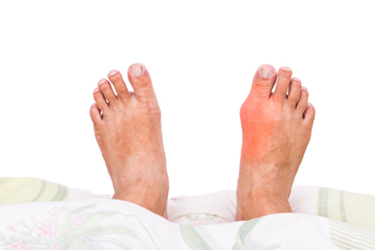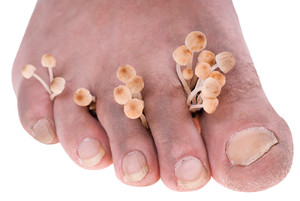May 2019
Possible Reasons for Gout Attacks
 People who experience gout attacks will most likely have severe pain and discomfort surrounding the big toe. It occurs as a result of crystals that develop from excess uric acid in the bloodstream. Research has indicated that men are more prone to developing gout than women, and the risk increases if obesity is a factor. Additionally, gout can develop if the patient has kidneys that are not functioning properly, or has high blood pressure. Some of the symptoms that are associated with this condition often include swelling on the big toe and surrounding areas, redness, and tenderness when touched. If you have frequent gout attacks, it is strongly advised that you seek the counsel of a podiatrist who can properly diagnosis and treat this painful condition.
People who experience gout attacks will most likely have severe pain and discomfort surrounding the big toe. It occurs as a result of crystals that develop from excess uric acid in the bloodstream. Research has indicated that men are more prone to developing gout than women, and the risk increases if obesity is a factor. Additionally, gout can develop if the patient has kidneys that are not functioning properly, or has high blood pressure. Some of the symptoms that are associated with this condition often include swelling on the big toe and surrounding areas, redness, and tenderness when touched. If you have frequent gout attacks, it is strongly advised that you seek the counsel of a podiatrist who can properly diagnosis and treat this painful condition.
Gout is a foot condition that requires certain treatment and care. If you are seeking treatment, contact Dawn Miles, DPM from Florida. Our doctor will treat your foot and ankle needs.
What Is Gout?
Gout is a type of arthritis caused by a buildup of uric acid in the bloodstream. It often develops in the foot, especially the big toe area, although it can manifest in other parts of the body as well. Gout can make walking and standing very painful and is especially common in diabetics and the obese.
People typically get gout because of a poor diet. Genetic predisposition is also a factor. The children of parents who have had gout frequently have a chance of developing it themselves.
Gout can easily be identified by redness and inflammation of the big toe and the surrounding areas of the foot. Other symptoms include extreme fatigue, joint pain, and running high fevers. Sometimes corticosteroid drugs can be prescribed to treat gout, but the best way to combat this disease is to get more exercise and eat a better diet.
If you have any questions please feel free to contact one of our offices located in Palatka and Saint Augustine, FL . We offer the newest diagnostic and treatment technologies for all your foot and ankle needs.
Are You Suffering From Ingrown Toenails?
The Importance of Caring for Diabetic Feet
Elevated blood sugar levels are the main cause of diabetes. People who have this condition have to pay extra attention in caring for their feet. Diabetic patients may experience a tingling feeling or numbing sensation, and this can make it difficult in noticing any cuts that may be present on the feet. This type of nerve damage can lead to an infection and can cause gangrene if it is not treated promptly. Typical symptoms of a foot infection can include fever, unmanageable blood sugar levels, and skin discoloration. If you are a diabetic patient and would like information about taking care of your feet, it is advised to seek the counsel of a podiatrist who can properly guide you.
Diabetic foot care is important in preventing foot ailments such as ulcers. If you are suffering from diabetes or have any other concerns about your feet, contact Dawn Miles, DPM from Florida. Our doctor can provide the care you need to keep you pain-free and on your feet.
Diabetic Foot Care
Diabetes affects millions of people every year. The condition can damage blood vessels in many parts of the body, especially the feet. Because of this, taking care of your feet is essential if you have diabetes, and having a podiatrist help monitor your foot health is highly recommended.
The Importance of Caring for Your Feet
- Routinely inspect your feet for bruises or sores.
- Wear socks that fit your feet comfortably.
- Wear comfortable shoes that provide adequate support.
Patients with diabetes should have their doctor monitor their blood levels, as blood sugar levels play such a huge role in diabetic care. Monitoring these levels on a regular basis is highly advised.
It is always best to inform your healthcare professional of any concerns you may have regarding your feet, especially for diabetic patients. Early treatment and routine foot examinations are keys to maintaining proper health, especially because severe complications can arise if proper treatment is not applied.
If you have any questions please feel free to contact one of our offices located in Palatka and Saint Augustine, FL . We offer the newest diagnostic and treatment technologies for all your foot and ankle needs.
Swollen Feet and Pregnancy
 As pregnancy progresses, the body’s natural response is to produce additional fluids that accommodates the needs of the growing fetus. Most women experience swollen feet as a result of this, which can be uncomfortable. Research has indicated this accounts for approximately twenty-five percent of the weight that is gained during pregnancy. There are additional reasons why the feet become swollen. These include standing for extended periods of time, drinking large amounts of caffeine, or eating foods that are high in sodium content. There are methods that can be implemented to help reduce possible swelling. These consist of elevating your feet frequently throughout the day, wearing shoes that are comfortable, and spending limited time outside in the warmer weather. If you would like additional information about how pregnancy affects the feet, it is suggested to speak to a podiatrist who can answer any questions you may have.
As pregnancy progresses, the body’s natural response is to produce additional fluids that accommodates the needs of the growing fetus. Most women experience swollen feet as a result of this, which can be uncomfortable. Research has indicated this accounts for approximately twenty-five percent of the weight that is gained during pregnancy. There are additional reasons why the feet become swollen. These include standing for extended periods of time, drinking large amounts of caffeine, or eating foods that are high in sodium content. There are methods that can be implemented to help reduce possible swelling. These consist of elevating your feet frequently throughout the day, wearing shoes that are comfortable, and spending limited time outside in the warmer weather. If you would like additional information about how pregnancy affects the feet, it is suggested to speak to a podiatrist who can answer any questions you may have.
Pregnant women with swollen feet can be treated with a variety of different methods that are readily available. For more information about other cures for swollen feet during pregnancy, consult with Dawn Miles, DPM from Florida. Our doctor will attend to all of your foot and ankle needs.
What Foot Problems Can Arise During Pregnancy?
One problem that can occur is overpronation, which occurs when the arch of the foot flattens and tends to roll inward. This can cause pain and discomfort in your heels while you’re walking or even just standing up, trying to support your baby.
Another problem is edema, or swelling in the extremities. This often affects the feet during pregnancy but tends to occur in the later stages.
How Can I Keep My Feet Healthy During Pregnancy?
- Wearing orthotics can provide extra support for the feet and help distribute weight evenly
- Minimize the amount of time spent walking barefoot
- Wear shoes with good arch support
- Wear shoes that allow for good circulation to the feet
- Elevate feet if you experience swelling
- Massage your feet
- Get regular, light exercise, such as walking, to promote blood circulation to the feet
If you have any questions please feel free to contact one of our offices located in Palatka and Saint Augustine, FL . We offer the newest diagnostic and treatment technologies for all your foot and ankle needs.
Athlete's Foot Causes Itching
 The symptoms that are associated with athlete’s foot consist of itching between the toes or on the bottom of the feet. In severe cases, blisters may form on the sole of the feet. It is produced by a fungal infection and is known to be contagious. The type of fungus that causes this condition lives in warm and moist environments. These include places such as public pools, showers, or locker rooms. Additionally, wearing damp socks and shoes for the majority of the day may contribute to getting athlete’s foot. There may be measures that can be taken to possibly prevent athlete’s foot. These include wearing shoes and socks that are made of breathable materials and wearing appropriate shoes while in public environments. If you have contracted athlete’s foot, it is advised to speak with a podiatrist who can begin the proper treatment.
The symptoms that are associated with athlete’s foot consist of itching between the toes or on the bottom of the feet. In severe cases, blisters may form on the sole of the feet. It is produced by a fungal infection and is known to be contagious. The type of fungus that causes this condition lives in warm and moist environments. These include places such as public pools, showers, or locker rooms. Additionally, wearing damp socks and shoes for the majority of the day may contribute to getting athlete’s foot. There may be measures that can be taken to possibly prevent athlete’s foot. These include wearing shoes and socks that are made of breathable materials and wearing appropriate shoes while in public environments. If you have contracted athlete’s foot, it is advised to speak with a podiatrist who can begin the proper treatment.
Athlete’s Foot
Athlete’s foot is often an uncomfortable condition to experience. Thankfully, podiatrists specialize in treating athlete’s foot and offer the best treatment options. If you have any questions about athlete’s foot, consult with Dawn Miles, DPM from Florida. Our doctor will assess your condition and provide you with quality treatment.
What Is Athlete’s Foot?
Tinea pedis, more commonly known as athlete’s foot, is a non-serious and common fungal infection of the foot. Athlete’s foot is contagious and can be contracted by touching someone who has it or infected surfaces. The most common places contaminated by it are public showers, locker rooms, and swimming pools. Once contracted, it grows on feet that are left inside moist, dark, and warm shoes and socks.
Prevention
The most effective ways to prevent athlete’s foot include:
- Thoroughly washing and drying feet
- Avoid going barefoot in locker rooms and public showers
- Using shower shoes in public showers
- Wearing socks that allow the feet to breathe
- Changing socks and shoes frequently if you sweat a lot
Symptoms
Athlete’s foot initially occurs as a rash between the toes. However, if left undiagnosed, it can spread to the sides and bottom of the feet, toenails, and if touched by hand, the hands themselves. Symptoms include:
- Redness
- Burning
- Itching
- Scaly and peeling skin
Diagnosis and Treatment
Diagnosis is quick and easy. Skin samples will be taken and either viewed under a microscope or sent to a lab for testing. Sometimes, a podiatrist can diagnose it based on simply looking at it. Once confirmed, treatment options include oral and topical antifungal medications.
If you have any questions, please feel free to contact one of our offices located in Palatka and Saint Augustine, FL . We offer the newest diagnostic and treatment technologies for all your foot care needs.











